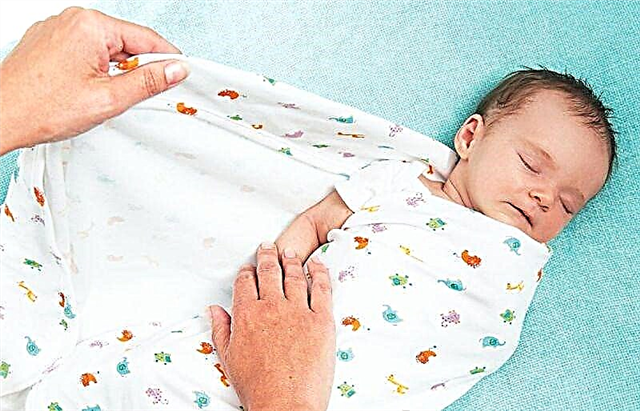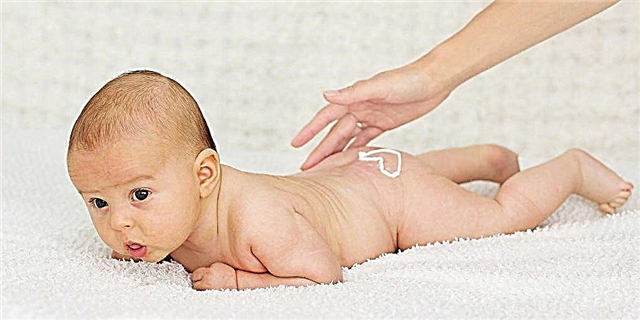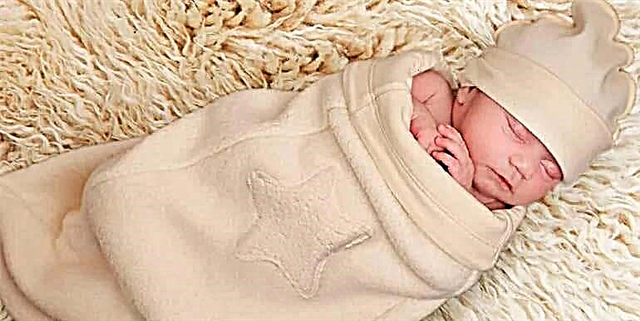A month old baby sleeps for a fairly long period of time. Therefore, when a nursing child does not sleep at night, groans and cries, parents begin to worry and look for the reason for such unusual behavior. All household members suffer from the continuous crying of children, as the usual family way of life is disturbed. To restore peace to the whole family, you need to understand why a newborn baby does not sleep at night and cries, and what to do to fix the problem.

Sleep is essential for a child's physical and mental development
The importance of sleep for child development
Sleep is a special function of the central nervous system that is necessary for the maintenance of normal life. During sleep, the NS unloads, the accumulated information is processed, and the reserves of active substances in the brain are replenished.
Sleep is even more important for a small child, since insufficient rest leads to serious consequences: the baby's immunity falls, he starts to get sick often. With sleep disorders, as experts explain, cognitive functions deteriorate, memory and attention suffer, mental activity slows down, and stress resistance decreases.
In addition, for infants, both daytime and evening rest is important in the process of normal development of the nervous system. During a night's rest, growth hormone or growth hormone is synthesized, which is also important for the child's body.
Note. In addition to the duration of the sleepy segments, their quality is of great importance, since, having well rested, the baby is in a cheerful mood.
If the child does not sleep and cries at night
There are situations when, instead of a sound and healthy sleep at night, the child does not sleep crying, and the worried mother does not know why this is happening. It is especially alarming if, during crying, the newborn begins to arch, cry, and nothing can calm him down. Such a situation is an immediate reason for contacting a pediatrician, who will identify the problem and recommend how to establish children's sleep.
Among other factors, the first thing that a pediatrician points out is a wrong daily routine. Every mother should know that in the evening, from about 21 to 22 hours, the body produces the sleep hormone, melatonin, which helps the child fall asleep. Therefore, if you are late with laying down in the evening, the baby's nervous system becomes agitated. There is a failure of natural biorhythms: it would seem that the child wants to sleep, but because of excessive excitability he cannot fall asleep. Being in this state, he begins to cry and be capricious.
In addition to violation of the regime, there are other reasons that do not make it possible to establish the correct rest of the baby. It is useful for mom to study them and make efforts to eliminate them.

An improperly formulated daily routine can cause vagaries while laying.
Reasons for staying awake at night
Mom, expecting that the newborn will sleep 18 hours a day, sometimes faces a situation where he breaks his schedule. Experts explain how this can be caused:
- Excited state of the baby from many impressions, loud noise, bright light, which is reflected in the nervous system, preventing him from falling asleep calmly;
- Improper diet of a nursing mother, including coffee or foods that excite the baby;
- Rapid maturation of the baby already in the first month, while the parents do not have time to introduce the ongoing changes into the regime. For example, 20 minutes of wakefulness in the first weeks almost doubles by the next month.
Physiological features
On a physiological level, falling asleep in a child is different from sleeping in an adult. Sleep consists of two alternating phases: slow and fast. In children, the main phase is the surface, which is the norm within a certain age. This feature can affect the quality of your baby's sleep.
Note! Parents need to know that in young children, most of the time is spent on REM sleep. An observant mother can easily determine this phase of dreams, since the eyes of the crumbs move quickly under the closed eyelids.
Experts, among others, name such physiological reasons that interfere with high-quality children's rest, such as teething and colic:
- When teething, any baby feels pain and severe itching in swollen gums. The painful condition is accompanied by diarrhea and high fever. During the day, the baby is distracted during wakefulness, and at night the discomfort increases;
- Colic accompanies almost all babies in the first year of life, as the normal microflora of the gastrointestinal tract is being formed. Tummy pains appear throughout the day, but are especially worse at night.
Psychological reasons
When a child suffers from insomnia, doctors consider the condition to be alarming. Newborns are hard to tolerate insomnia: they often cry, eat poorly, become inhibited, with suffering facial expressions, convulsively clench their fists.
As a result of insomnia, children already from 3-4 months suffer from emotional agitation or, conversely, exhaustion. Such violations at a later age lead to the fact that they refuse to contact with peers and adults, dramatically change emotions, up to aggression.
The psychological causes of poor sleep in babies are often stressful situations, for example, noise while lying down, an unusual environment, overexcitement from a large number of impressions.

In newborns, insomnia is accompanied by frequent crying and convulsive clenching of the fists.
Note! Pediatricians often refer to infant insomnia as behavioral. It can be caused by the wrong behavior of the mother herself, who lays down her child using motion sickness on her hands, a bottle of formula milk and similar rituals. As a result, the child gets used to them, later, teaching him to fall asleep on his own, the mother abruptly breaks the usual way and contributes to the development of insomnia.
In most cases, psychological disorders do not require serious medical intervention, they disappear without a trace after the mother begins to control her behavior and regulate the child's day regimen.
Sleep disorders
Often, childhood sleep disorders cause disturbances in the activity of the central nervous system. Experts call such pathologies parasomnias, that is, unwanted behavioral reactions when falling asleep, while sleeping, or when waking up. They are usually associated with a slow phase.
Because of the pathology, the child begins to cry uncontrollably, which frightens the parents. It can take up to half an hour before he can be soothed and put to sleep.
Only a neurologist can determine the nature of the violation, therefore, with any suspicion of psychological abnormalities, you should consult a specialist.
Obstructive sleep apnea (OSA) is considered another alarming pathology leading to poor sleep in infants. OSA is characterized by partial or complete occlusion of the upper airways during sleep, resulting in respiratory arrest. Symptoms of the pathology are quite vivid: the baby can snore, choke, sweat a lot. It was revealed that OSA syndrome occurs in 3% of newborns.
Note. Pathology occurs due to enlarged tonsils or adenoids, obesity, maxillofacial anomalies, muscular dystrophy.
Other causes of insomnia
Among the possible causes of childhood insomnia, pediatricians call pharmacological, since many drugs have side effects that lead to sleep disturbance. For example, these are nootropics prescribed for the mental development of a child, or anticonvulsants. Such medicines should not be given to a child before laying.
How to solve a child's persistent sleep at night
Answering the parents' question why a newborn child does not sleep at night and cries, experts emphasize that the baby wakes up unconsciously. So, there are reasons that make him wake up and scream. Pediatricians draw the attention of parents to the fact that eliminating the causes and creating special conditions for sleep can solve this problem.
Creating conditions for sleep
All experts are unanimous in the opinion that creating favorable conditions will help improve the sleep of a newborn. They recommend that parents follow these rules:
- The air temperature in the children's room should be no more than 20 degrees. To avoid overheating, experts advise not to cover children under one year old with a blanket, but to use comfortable sleeping envelopes;
- Provide access to fresh air, that is, airing the children's room at any time, avoiding drafts and cold air entering the child;
- Creation of “white” noise - a smooth sound that helps the newborn to ignore sudden noises and fall asleep soundly. Do not do absolute silence when laying;

Creating a supportive environment will help improve baby sleep
- Comfortable sleepwear, which should be made only of natural materials and should not hinder the movement of the child. Pajamas are well suited for any time of the year, allowing you to maintain the optimal body temperature of the crumbs, carry out normal air exchange, preventing overheating or freezing;
- Purchasing the right bedding, such as a spacious crib, quality bedding.
Ensuring a calm mental state of the child
Many psychological disorders of childhood sleep are age-related and, with the right attitude, can go away without active treatment.
Most importantly, parents should make sure that all the conditions necessary for falling asleep are met. This is especially true for the formation of positive associative links with sleep. For example, if the baby refuses to sleep, useful rituals such as bathing, massage or a lullaby will help.
Babies aged 9-12 months who need a short nap of sleep often refuse to fall asleep in the evening if the daytime sleep conditions have been disturbed. Experts advise that if the baby was put to bed a day later than usual, it is better to wake him up at the same time in order to restore the regime.
Normalization mode
The most common reason why a baby sleeps a little, often wakes up or cries in a dream is an incorrect daily routine, in which there is not enough time for day and night rest.
In each age period there are norms for total sleep duration and wakefulness intervals. Compliance with these standards will eliminate the child's fatigue, which does not allow a sound fall asleep.
When to contact a specialist
If the mother sees that the child has begun to sleep poorly, you can carefully observe how many hours and how soundly the baby sleeps. Then write down the observations in a special diary.

If mom is unable to ensure normal sleep, you need to see a doctor
Important! If a child has had more than three sleepless nights in the last 3 months during the week, you should seek a referral from a psychologist or neurologist. Neurological pathologies can cause poor sleep. Therefore, if a child constantly does not sleep well, often wakes up, groans, shudders, bends and starts crying in a dream, it is recommended to show him to a specialist.
Quality sleep is very important for a child's physical and mental development. If he does not have enough deep sleep for a long time, then there is a delay in body weight and growth retardation. In addition, a good rest for the baby is necessary not only for him, but also for the whole family, since a general sleep disorder can lead to family conflicts and depression in a nursing mother.



